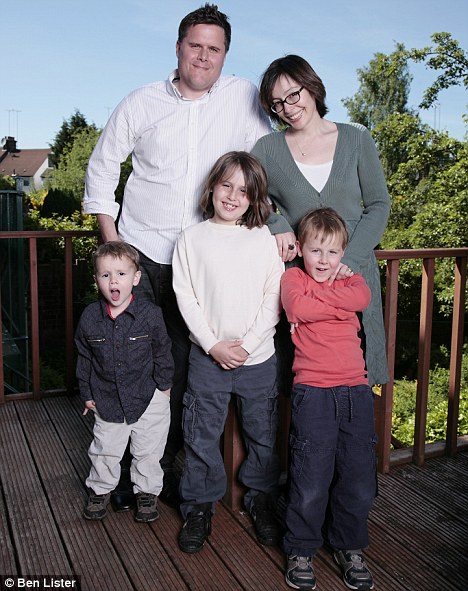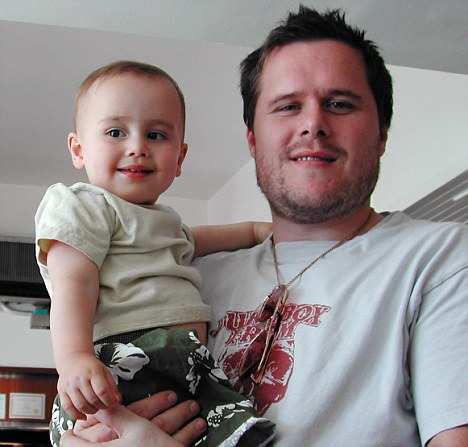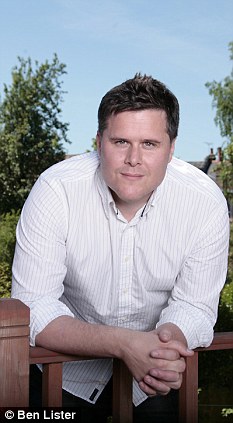I lost ten years of my life as a middle class, NHS sponsored drug addict...
By
Philip Robinson
Last updated at 1:36 AM on 12th October 2010
Philip Robinson was 25 when he went to his GP with mild depression. The pills he was prescribed changed his life, turning him into a 'zombie-like' addict — just one of the 1.5 million Britons whose lives have been ruined by prescription drugs. Here, with extraordinary candour, he reveals how he battled to get his life back.
The problem began when I got married. Uncertain about the commitment I had just made and torn between wanting to leave my wife and not wanting to hurt her, I started to drink.
I wasn’t desperately depressed, nor was I drinking myself to oblivion. In fact, compared with my fellow journalists on the lads’ magazine Loaded, where I worked at the time, my drinking wasn’t a problem; I was just going through a low point.
It was 1998. I was 25 years old, and had been married for just a year when I went for the doctor’s appointment that would drive me to the edge of insanity and rob me of the next ten years of my life.

Back from the brink: Philip with wife Anna and their children. He became hooked on tranquillisers prescribed to beat mild depression
I was told, in the nicest possible way, that I was a depressed alcoholic. I was so shocked I gave up drinking immediately. I have not touched a drop since.
Then the doctor prescribed 90 Valium pills and a bottle of beta blockers to help with stress, and recommended I visit a psychiatrist in Harley Street.
I can still remember looking at the bottle in disbelief. I’d seen people thrown out of nightclubs for possessing two of these pills. The doctor had just given me 90!
What I didn’t realise at the time was that antidepressants and tranquillisers create long-term users. Thanks to the pills that my doctor had just handed over like Smarties, I was already on the road to what is known as ‘involuntary tranquilliser addiction’.
Put simply, this is where people seeking short-term help for anxiety end up hooked on powerful mood-altering drugs, sometimes for life. I had just been turned into a middle-class, NHS-sponsored junkie, one of the 1.5 million Britons addicted to prescribed medication.
It comes at a price for the NHS, too: the health service spends £3 billion a year on tranquillisers and antidepressants alone.
Even back then I was shocked to be given so many drugs by the NHS. I remember one colleague noting the number of pills I was packing away in the course of day and telling me to take half. But, as far as I was concerned, I’d obtained these drugs from the doctor, and doctor knows best.
In Harley Street I was given my first supply of anti-depressants and told that I was simply suffering from anxiety and depression.
After a few months I was no better. In fact, I was miserable, and seemed to be experiencing new nervous symptoms. In hindsight I was probably suffering side-effects from the drugs.
'My wife became accustomed to my ever-changing personality, which altered according to whichever pills were being tried out on me by my psychiatrist'
Over the next few years, Anna, my wife, became accustomed to my ever-changing personality, which altered according to whichever pills and dosages were being tried out on me by my psychiatrist in Harley Street.
Despite the side-effects, Anna and I both trusted the doctors and I tested a host of antidepressants and mood-altering pills, trying to find the right combination that would cure my depression and give me back my life.
I remember these pills mostly for their side-effects. In one instance, I was offered a choice of two pills: one would make me fat, the other would give me a sexual dysfunction. I chose the weight gain.
Another course of pills made me vomit violently if I took them on an empty stomach.
Feeling increasingly depressed, dislocated, and paranoid, I was starting to lose sight of who I was. I began to display the symptoms of someone who was genuinely mentally ill and I took to sleeping all day, unable to get out of bed.
I left full-time work to recover at home and retreated from all but two or three of my friends. Anna loyally stood by me, even though I was growing more angry, depressed and unstable.
I had also become hooked on Valium. If I ran out of pills and the doctors’ surgery was closed, I would go to the hospital for an emergency prescription or face cold turkey.
Unlike illegal drugs, prescription drugs are incredibly convenient. You can unscrew the lid while walking for the bus, take a couple of neatly pressed, official-looking pills — medicine — and slip into a metaphorical side room. Tranquilliser users watch life though a chink in a pharmaceutical curtain, unable to participate in their own existence.

Philip in the grip of addiction when son Oscar was aged one: He struggled to cope with the pressures of marriage and fatherhood but his prescribed medication was more curse than cure
Five years after my first prescription, it seemed there wasn’t an antidepressant in the world that worked on my brain, yet my Harley Street doctor seemed determined that there was a pharmaceutical answer to my problem.
I was depressed, but Anna and I did have some moments of happiness and normality. We had moved into a new house and Anna was pregnant with our first child. I felt that this was my side of the arrangement, my duty, and that I owed her a child.
I loved her, but I was pretending to be a normal dutiful caring husband when, in reality, I was little more than a waxwork.
My state worsened when I was put on a powerful (and expensive) anti-epileptic drug called Depakote. Depakote is so toxic that it requires a blood test to be taken first.
I am not epileptic, but the pill is commonly given to severely ill people who are bipolar. As far as I knew, I had not been diagnosed with either illness.
'I’d gone to my doctor initially to seek help because I was a young man, overwhelmed by the responsibility of marriage. At what point did I acquire severe mental health issues?'
I got my blood tests done and took Depakote alongside Effexor (an antidepressant), Valium (a tranquilliser) and Zopiclone (a sleeping pill). All I required was a pair of baggy trousers and green face paint and I could have doubled up as a zombie.
I found myself unable to laugh, or smile, or cry. I was taking more and more Valium to cope with mood swings related to taking Valium. I was by now taking double or triple my original prescribed dose.
An additional problem was that heavy doses of tranquillisers slow your breathing and suppress your gag reflex.
One night, after approximately 70mgs and some sleeping pills, I woke up aware that I was about to swallow my tongue, which had lolled back into my throat, almost creating an airtight seal. Fortunately, I had enough air in my lungs to cough it out. I remember not feeling concerned at the time.
As the Depakote established itself in my brain, I became cold and detached. I had ‘decided’ to live nocturnally, as this was optimum for my writing. I wanted peace and quiet. I avoided my young family, content with silence and the sound of blood pulsing in my ears.
After a few months of this weird, living death I was incapable of understanding or empathising with other peoples’ emotions. None of it seemed relevant.
The tipping point came when I visited my GP to speak about my continuing prescriptions. She clicked through my records on her screen and casually noted that I should continue my medication because I was listed as being on my local council’s Severe Mental Health Register.
Severe Mental Health Register? I left the appointment consumed by a sense of tragedy.
I’d gone to my doctor initially to seek help because I was a young man, overwhelmed and confused by the responsibility of marriage. At what point did I acquire severe mental health issues?
When did I become a threat to myself and others? I’m a threat to an open packet of chocolate biscuits, but not much else. I had found rock bottom.
Deep down, I knew that I couldn’t be bipolar and I had not been diagnosed as such. I was a happy child from a lovely family. My upbringing was so great that when I described it to psychologists, they seemed to be convinced I was making it up to conceal my inner torment.
I realised the only way to find out who I really was would be to get my brain chemistry back to how it was when I could last remember feeling normal. Back to before I ever saw a doctor or even had a drink.
I needed to be a kid again. I went back to see the doctor a couple of weeks later and told her that I had made the decision to come off the pills.
She wasn’t so sure and warned that my mental health might well collapse if I stopped taking the drugs and that there was a risk of hospitalisation. I wasn’t offered any help or advice.

Recovered: Philip believes counselling can be better than pills for people suffering from depression
Despite this prophecy of doom hanging over me, I found dropping the bipolar pills to be a slow, but relatively easy process. About a month after I stopped taking them, the world seemed brighter and I started to write again and feel alive.
I filled up notepads with ideas, and Anna noticed that I was more engaged with life, she could see my old self coming back.
A couple of months later, only Valium remained. I had now been on these mood-altering tranquillisers for ten years and lowering the dose was an agonising battle. Each milligram I took out of my bloodstream was paid for by huge ebbs and flows in my sanity levels.
Over the next two years, I threw myself into bout after bout of Valium withdrawal, lowering the dose each time and enduring what felt like a three month-long Mad Hatter’s tea party in my head.
I was also at risk, according to the medical profession, of suffering a convulsion or brain seizure. I was altering the very chemicals in my brain that helped me exist.
Eventually I found some help on the internet: a programme for tapering the doses designed by Professor C. Heather Ashton, Emeritus Professor of Clinical Psychopharmacology at the School of Neurosciences at the University of Newcastle upon Tyne.
Tranquilliser withdrawal is medically accepted to be worse than heroin withdrawal, yet — as the All-Party Parliamentary Group for Involuntary Tranquilliser Addiction concluded only last year — most doctors are unaware of the problem, or have no facility to help those whose lives have been ruined by addiction to prescribed medication.
After two years of pain, paranoia, sleeplessness and torment, I successfully completed withdrawal.
I had pushed my relationship with my wife and children past any regular limit and feel as if I will be making up for their memories of my anger and mood swings for the rest of my life.
After it was over, I made an appointment to cancel my Valium prescription. Another GP asked me if I would write down how I did it, so he could use the method with his other patients. I got the impression that most of the people who are prescribed these pills never come off them, content to remain zombies until death.
As of writing, I am 37 and two years clear of my last prescription. I have no mental illness apart from a low hum of depression (partly to do with my situation, as I feel that I have wasted a lot of time).
Life has happy and sad days as it does for everybody, and my mood moves up and down with it. I don’t drink, but only because I know it makes me miserable for a week after I do it, and I accept that at various stages in our lives some of us are more prone to sad thoughts than others.
I think it is more effective to heal ourselves with counselling than pills. What troubles me is that doctors are still prescribing these drugs to people looking for a cure for temporary anxiety, exposing them to the risk of years of addiction, severe depression plus an increased risk of job loss, marital problems, even suicide.
That’s quite a list of consequences for someone who begins taking a tranquilliser because their new job is giving them sleepless nights, for example.
These drugs do have a role to play, but only in the most severe life-or-death situations. We do not perform lung surgery on people with chesty coughs, so why do we give drugs of almost unknown power to people with mild, temporary depression?
To overcome our problems we have to talk through them, understand them and accept them. Not hide from them behind a chemical curtain.


This is an all too familiar tale and one that we frequently hear about and treat at Broadway Lodge. Recovery is possible. There is no quick fix but with support, encouragement and time, a healthy and productive life can return.
- Peter Smith, Weston s Mare, UK, 13/10/2010 15:31
Report abuse